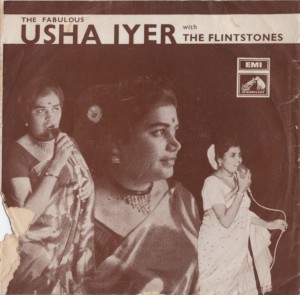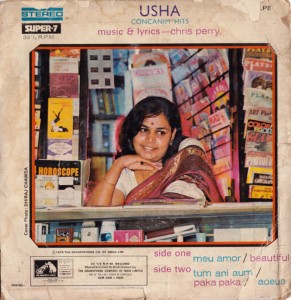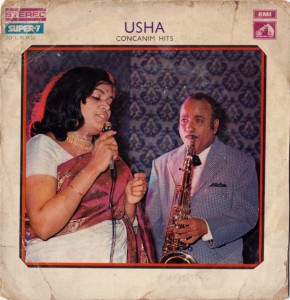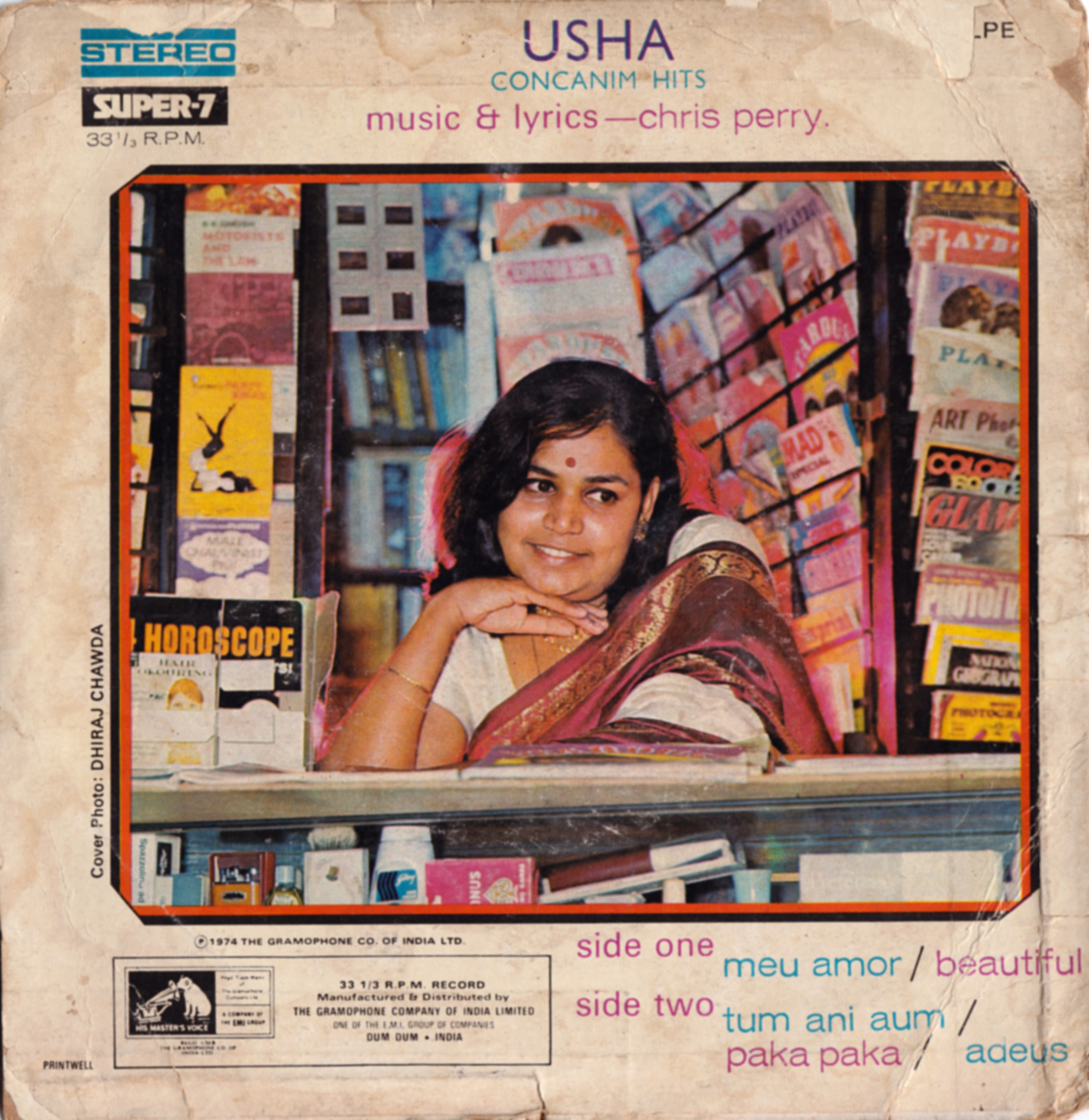Usha Uthup, who won a Padma Shree this year, hasn’t stepped out of the spotlight since she first started belting out Broadway tunes and pop standards in 1969 in venues similar to this one, depicted in the 1972 film Bombay to Goa. She’s performed across the length of the country, recorded more than two dozen albums and has been featured on several popular Bollywood tracks. More importantly, she’s single-handedly created the paint-by-numbers kit that anyone hoping to make a living out of performing pop in India must follow: sing in an Indian language (or several); tour incessantly both in small-town India and to diasporic outposts in New Jersey, Hong Kong and Nigeria; cherry-pick film assignments; and never, ever stop enjoying yourself on stage. “I’m a people’s person,” Uthup told me. “I’ve never been bothered by people saying I play to the gallery – because I do. Without the gallery I’m nothing.”

 A couple of years ago, I asked her to take time off from rehearsals to do an interview with me in the place where it all started: the Talk of the Town, which had first been been rechristened Jazz by the Bay, then metamorphosed into Not Just Jazz by the Bay and is now the distinctly unmusical Pizza by the Bay. As we drove to the venue from the Cricket Club of India around the corner, she pointed out several other nightclubs that were the alive with music when she made her debut – the Little Hut and Venice on JN Tata Road, and Berry’s, Gaylord and the Other Room among other venues on Veer Nariman Road (or Churchgate Street as it was then called).
A couple of years ago, I asked her to take time off from rehearsals to do an interview with me in the place where it all started: the Talk of the Town, which had first been been rechristened Jazz by the Bay, then metamorphosed into Not Just Jazz by the Bay and is now the distinctly unmusical Pizza by the Bay. As we drove to the venue from the Cricket Club of India around the corner, she pointed out several other nightclubs that were the alive with music when she made her debut – the Little Hut and Venice on JN Tata Road, and Berry’s, Gaylord and the Other Room among other venues on Veer Nariman Road (or Churchgate Street as it was then called).
“The whole thing has been turned around,” she said, waving her hands across the darkened room. In the renovated Not Just Jazz by the Bay, the audience sat where the band used to perform, while the bar ran across what used to be the seating area. On the wall next to the bar was an old black-and-white photo of the establishment on the day it opened its doors: December 31, 1969. If you looked hard, you could see a hand-written sign in a corner announcing the star act: Usha Iyer, as she was then known. “Today,” said the grandmother of two, pointing to the ceiling, “the only thing that remains the same is that chandelier and me.”
It’s easy to imagine how strange Uthup must have appeared to sophisticated Mumbai nightclub audiences when she first appeared at the Talk of the Town, performing jazz standards clad in her trademark Kanjivaram saris and glittery bindis (which seem to have expanded in direct proportion to the city’s population). “Where it was the prerogative of Anglo-Indians coming out in their slinky black dresses and singing in nightclubs, I changed it by just coming in a sari,” Uthup recalled. “Slowly, the nightclub became a place that was not just frequented by men. It became a family thing because they found this very homely looking person singing there. People didn’t hesitate to bring their wives or mothers or sisters. They figured that if Usha Uthup was singing, it couldn’t be that bad.”
Uthup, who never formally studied music, had as role models her two elder sisters, Indira and Uma, who performed close-harmony swing tunes at gymkhanas and clubs as the Singing Sami Sisters (Uma Sami, would go on to record the anthemic “Bombay Meri Hai” under her married name, Uma Pocha.) One of six children, Uthup – who used her the name of her first husband, Iyer, when she first started performing, and took her second husband’s name after she remarried – remembers that her Byculla home resounded to an eclectic selection of music. “We heard varied kinds of music from Beethoven to Bach to Bade Ghulam Ali Khan, Kishori Amonkar and Cliff Richard and the Beatles and Frank Sinatra,” she recalled. “It was really mixed.” But most of all, the airwaves were her teacher. She said, “When people ask me who’s your inspiration, I say Radio Ceylon.”
Her father, Vidyanathan Sami, was a policeman who worked in the Crime Branch and in the Prohibition department. This latter posting was a source of reassurance to some of the musicians with whom Uthup worked early in her career. Many of them were hard-drinking Goan musicians and they would invoke Sami senior’s name to be let off the hook whenever they were picked up in police raids on the speakeasies (known as auntie’s bars) that dotted Mumbai in the 1960s.
Uthup’s distinctive contralto was already in evidence even when she was a student at the Convent of Jesus and Mary on Clare Road. “Ms Davidson always threw me out of class because she couldn’t fit my bass voice in,” joked Uthup. “But they recognised that there was something musical about me, so I was allowed to play clappers or the triangle.” Uthup says that her first professional performance came during a family holiday to Chennai, when an aunt and uncle took her family to a nightclub called Night Gems. “There was a band playing and my aunt and uncle asked me to sing because they knew that I was always the life of the party,” Uthup said. “I got up and sang and found that they all clapped their hands. So I sang some more and then a little, and before I knew it an hour had passed. Then the band got me to sing with them for the whole week, and at the end of the week they gave me a Kanjivaram sari.”
The first tune she performed that night in 1968, she said, was “Fever”, the song that would headline the first album she cut, a jazzy set of tunes titled Scotch and Soda. “Usha Iyer has happened!” crow the somewhat-confusing liner notes. “There is no other way to describe this artiste who, in her simple saries and deceptive mannerisms, bowled the youngster over!” Over the decade, other LPs followed, each with songs reflecting changing musical tastes: “Usha Sings Love Story and Other Hits” has a photo of her looking like Joan Baez in a sari, while on “Usha Sings Beautiful Sunday and Other Hits” her backing band are hirsute hippies.
 In 1974, when Uthup was singing with the trumpet player at the Ritz, just past Eros Cinema, the Goan bandleader Chris Perry approached her with a suggestion. “He came to me one day and said, ‘What men, let’s record men.’ So I said, ‘Okay men.’” Their collaboration resulted in two EPs with fabulously funky tunes, like Paka Paka. The cover has her looking out from behind the counter the hotel’s magazine kiosk. “I worked very hard on the tunes,” Uthup recalled. She wrote down the Konkani lyrics in Roman and the band rehearsed several times before it went into the HMV studios on PM Road – studio time was precious, so there was no room for mistakes.
In 1974, when Uthup was singing with the trumpet player at the Ritz, just past Eros Cinema, the Goan bandleader Chris Perry approached her with a suggestion. “He came to me one day and said, ‘What men, let’s record men.’ So I said, ‘Okay men.’” Their collaboration resulted in two EPs with fabulously funky tunes, like Paka Paka. The cover has her looking out from behind the counter the hotel’s magazine kiosk. “I worked very hard on the tunes,” Uthup recalled. She wrote down the Konkani lyrics in Roman and the band rehearsed several times before it went into the HMV studios on PM Road – studio time was precious, so there was no room for mistakes.
Uthup’s decision to sing in another language wasn’t so unusual. Early in her career, during a famed stint in Trinca’s in Kolkata, she’d sung tunes in Punjabi. “I learnt very early in life that even if I sang in a nightclub or was doing a jazz set, the minute I broke into Hindi or Marathi, it had a whole different context with the audience,” she said. “It struck a little chord and gave me a fantastic feeling. I learnt early that it’s one of the USPs for me. So I started building up on my repertoire of languages.” Uthup has recorded tunes in 13 Indian languages and eight foreign ones.
Though her jazz audiences were a little taken aback by tunes in other languages, the move opened other doors for her. Hearing her in a Delhi nightclub in 1969, the film producer Dev Anand asked her to sing in Hare Rama, Hare Krishna. She has sung on several soundtracks since then, including on Shaan, Shalimar and Dewaar.
All the while, Uthup said, she’s got her biggest thrill not from recording but singing for audiences. “Most people think that a stage is a question of levels: up and down,” she noted. “For me, a stage is always one level. I’ve never thought of myself of being on a pedestal looking down on people and singing to them: I’ve always sung with them, and wanted them to sing with me.”



3 comments
apropos of nothing, i wandered into this book website today only to be confronted by Usha Uthup.
After my Std 3 class teacher, UU was the next person with whom I violently fell in love. Once she eloped in the middle of the academic year, the former entered the blackest of all my books, but UU, for the last three decades, has committed no transgressions whatsoever. The very mention of her name would send waves of frisson all through my inner self for many years, and perhaps it still does. I dont know what it was about her – it certainly wasnt just the voice, but clearly her bindi and dental imperfections, not to mention, her by then onomatopoeic name, contributed significantly. Her very persona – a homely maami belting out numbers in gorgeous silk sarees (i swear i could make out their colours on our B&W EC TV) – endlessly fascinated me and could well have helped resolve any residual Oedipal complexes!
One fine day, sometime in the early 1980s, before I was 10, i think she packed her bags and went off to, as i found out later, Calcutta; there was nobody more despondent than me in Bombay. Her frequent appearances on Bombay Doordarshan sort of dried up gradually before stopping altogether. I think she resurfaced in public life after nearly two decades much to my delight.
And all this without ever having seen her perform live!
Naresh… Usha to my mind had two sister Uma and Indira( I think) They hit the header as the Sami Sisters If I am not wrong Uma became Uma Pocha the singer and Indira… but memory fades me now God bless those talents
Our entire family are ardent Usha fans. Simply love to hear her over and over again! Last heard at her performance in the open at the Bandra-Kurla-Complex open air belting all old goldies to repeat once mores.
May the UU clan increase to keep us entertained – Mumbai Amchi re is my all time favourite! Long live Usha!